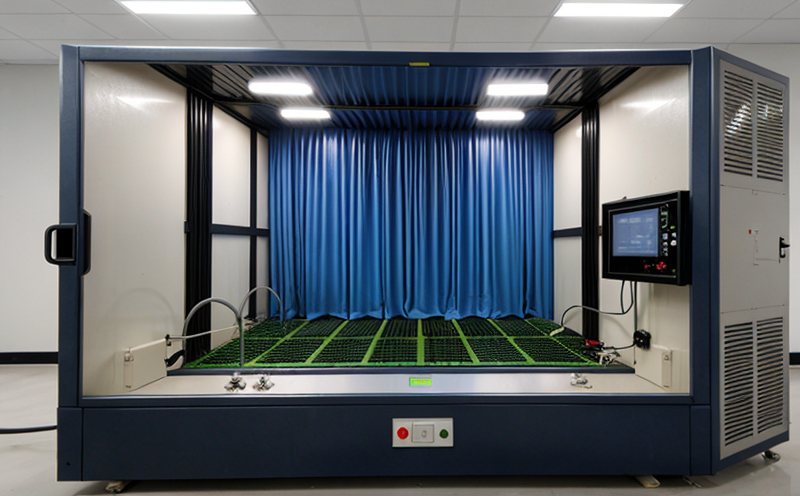UL 746C Environmental Resistance Testing for Polymeric Materials
The UL 746C environmental resistance testing standard is a critical component in ensuring that polymeric materials perform reliably under diverse and harsh conditions. This test evaluates the resistance of these materials to environmental factors such as heat, cold, moisture, sunlight, and other climatic influences. The primary focus of this service is to simulate real-world exposure conditions, thereby providing manufacturers with valuable insights into the durability and longevity of their products.
UL 746C testing is widely used in industries where product integrity under extreme environmental conditions is paramount. This includes sectors such as electronics, automotive, aerospace, and consumer goods. By subjecting polymeric materials to controlled climatic and environmental stressors, this test helps engineers and quality managers identify potential weaknesses before products are deployed.
The testing process typically involves exposing the specimens to a series of temperature and humidity cycles designed to mimic various real-world conditions. The duration of these cycles can range from 100 hours up to several hundred hours, depending on the specific requirements of the product being tested. After exposure, the specimens are visually inspected for signs of degradation such as cracking, discoloration, or loss of elasticity.
The UL 746C standard specifies detailed procedures and acceptance criteria that must be met by the material to pass the test successfully. Compliance with these standards ensures that products not only meet regulatory requirements but also maintain their integrity under expected environmental conditions. This is particularly important for polymeric materials used in outdoor applications, where exposure to UV radiation, moisture, and temperature fluctuations can significantly impact performance.
One of the key advantages of this test lies in its ability to predict long-term product behavior by simulating short-term environmental stressors. By understanding how a material responds under controlled conditions, manufacturers can make informed decisions about material selection and formulation, ultimately leading to more robust products.
The UL 746C standard is recognized internationally for its rigorous approach to evaluating polymeric materials. This recognition ensures that the test results are widely accepted across different regions, making it easier for companies to comply with global standards and regulations. The standard's international acceptance also facilitates smoother trade processes between countries and fosters a more harmonized regulatory landscape.
Manufacturers who invest in UL 746C testing gain several benefits beyond mere compliance. They can enhance their product reliability, reduce warranty claims, and improve customer satisfaction by ensuring that products perform as expected under real-world conditions. Additionally, successful completion of this test can serve as a competitive advantage, demonstrating to customers the manufacturer's commitment to quality and durability.
- Comprehensive Environmental Exposure: The test exposes specimens to a variety of environmental factors including heat, cold, moisture, and sunlight.
- Detailed Reporting: Extensive documentation is provided, offering insights into material performance under different conditions.
- International Recognition: Results are accepted globally, simplifying compliance with international standards.
- Enhanced Product Reliability: Understanding how materials perform under stressors helps in product improvement and development.
- Competitive Edge: Demonstrating adherence to high-quality standards can be a key differentiator for manufacturers.
- Cost-Effective Early Detection: Identifying issues early through testing reduces potential costs associated with product failures later on.
- Regulatory Compliance: Ensures that products meet necessary international and local regulations.
- Data for R&D: Provides valuable data for research and development efforts, guiding future product improvements.
In conclusion, UL 746C environmental resistance testing is an essential service for any manufacturer dealing with polymeric materials. It provides a robust framework for evaluating material performance under real-world conditions, ensuring that products meet both regulatory requirements and customer expectations. By investing in this test, manufacturers can enhance product reliability, reduce risks, and gain a competitive edge in the global marketplace.
Eurolab Advantages
At Eurolab, we pride ourselves on delivering high-quality environmental resistance testing services that meet or exceed industry standards. Our state-of-the-art facilities and experienced technical staff ensure consistent and accurate results. Here are some of the key advantages our clients can expect:
- Expertise in Polymeric Materials: We have extensive experience working with polymeric materials, ensuring thorough testing.
- Comprehensive Testing Capabilities: Our laboratories offer a wide range of environmental tests tailored to various industries and applications.
- Accurate Reporting: Detailed reports are provided, offering comprehensive insights into material performance.
- Global Recognition: Our test results are widely accepted internationally, simplifying compliance with global standards.
- Fast Turnaround Times: We strive to deliver accurate and reliable results quickly, minimizing delays in product development.
- Dedicated Client Support: Our team is always available to answer questions and provide guidance throughout the testing process.
- Continuous Improvement: We regularly update our testing methods and equipment to ensure compliance with the latest international standards.
With Eurolab, you can trust that your environmental resistance testing will be conducted with precision and care. Our commitment to excellence ensures that every test is conducted according to the highest standards, providing you with reliable and actionable data for your product development process.





